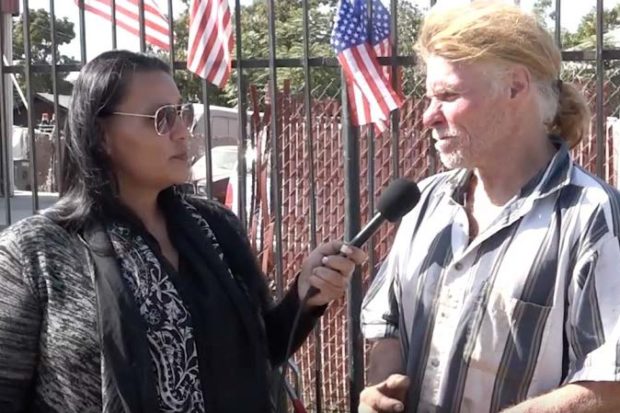
By Mike Rhodes
The police made their first arrest of a homeless man under the No Camping ordinance one week after the Standing in Solidarity with the Homeless event. Jerry Mulford was arrested in front of the Poverello House, a social service agency for the homeless in downtown Fresno. According to Mulford, after his arrest, most of his property was taken and immediately destroyed by city workers.
In an interview with Desiree Martinez, who is with the group Homeless in Fresno, Mulford said that before he was arrested a police officer asked if he needed assistance with social services. This is a part of the procedure the police say they will use before making arrests. First, they ask the homeless person to move on and then they ask if the person would like to go to Map Point, which is a homeless intake program.
In the interview with Martinez, Mulford said he told the officer that he goes to Map Point almost every day, but they have not been able to help him get off the streets. Because there is no safe and legal place in Fresno for homeless people to go, the inevitable result was that Mulford was arrested and taken to jail. He was released later that day, but with most of his property destroyed and the rest taken by city workers, he was in a much worse place than he was before his encounter with the police.
This arrest exposes some of the flaws of the No Camping ordinance. Arresting homeless people who have no place to go and who can’t get help from social service agencies is expensive and not helpful. With a minuscule number of shelter beds available in Fresno each night and thousands of homeless people on the streets, the ordinance is symbolic of the cynical manifestation of the “tough love” policy at City Hall. Making homeless people’s lives more difficult and miserable is not going to end homelessness.
What homeless advocates have also found out is that the ordinance is being used by the police as a reason to stop homeless people and run a background check on them to see if they have any outstanding warrants. That is when those unpaid citations for jaywalking, littering or other nefarious crimes are used to further threaten and intimidate them.
Fortunately, there is a legal team looking at challenging the ordinance based on both its implementation and how it is violating homeless people’s constitutional and human rights.
*****
Mike Rhodes is the author of Dispatches from the War Zone: Homelessness in Fresno 2002–2015. Contact him at mikerhodes@comcast.net. For more information, visit www.mikerhodes.us.
